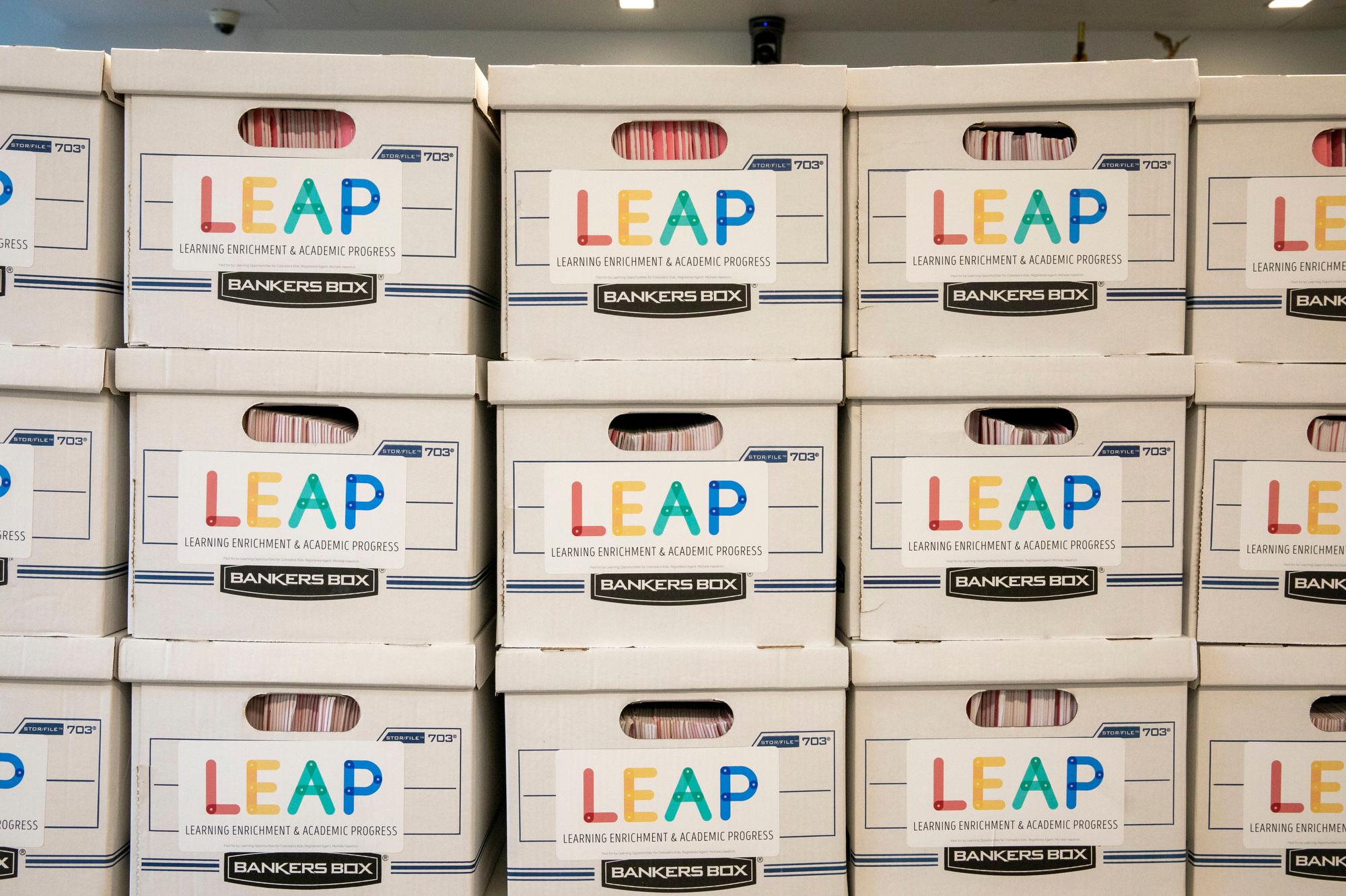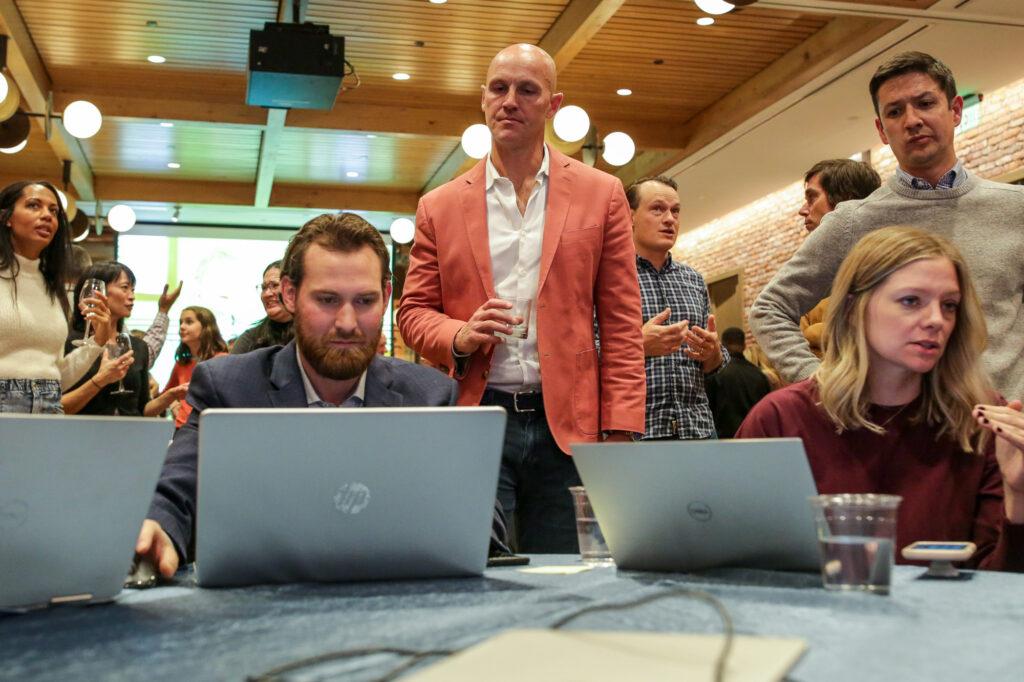
Supporters of a proposal that would have raised more than $150 million in increased cannabis taxes for out-of-school learning opportunities for low-income children have conceded defeat of the measure, Proposition 119.
Election returns Wednesday morning showed more than 54 percent of voters had opted against the measure that would have given money to families to fund extracurricular activities like tutoring, sports and theater for kids. More than 1.2 million votes were cast in the race Tuesday.
CPR News is not calling race results, but is reporting preliminary vote totals as they are announced. The Associated Press is also not calling races in Colorado this election. The election will not be final until the results are certified.
Supporters for the proposal raised at least $2.6 million, while opponents didn’t mount much of a coordinated campaign, though a cannabis group that was opposing the measure had raised about $55,000. The nonprofit group Gary Community Ventures spearheaded the unsuccessful bipartisan effort to pass Proposition 119.
On Tuesday night, at a results watch party in Downtown Denver, supporters of the effort gathered and watched as results didn't go their way.
Supporter spokesman Curtis Hubbard said that the achievement gap between wealthy families and low-income peers — exacerbated by the COVID-19 pandemic — will likely get worse before it gets better after Proposition 119's defeat.
He blamed the defeat in part on his campaign spending time addressing opponents' claims about the measure.
"Rather than being able to bring people together around the critical needs that are facing kids in Colorado, we spent a lot of time addressing the sort of misinformation that was out there about what this would and would not do," Hubbard said at the watch party.
“We know learning loss among our kids escalated as a result of the pandemic, and it’s disappointing that we were unable to bring people together to address this critical issue,” Hubbard said in a release.
Opponents of the measure said it would have taken dollars away from public education and would have instead funded private companies to provide services.
Judy Solano, a former state representative and chair of the nonprofit Advocates for Public Education Policy, said as results came in Tuesday that opponents waged a grassroots effort to oppose Proposition 119 through word of mouth, social media and opinion pieces in the newspaper.
“This is quite a victory for public education because I think the voters understood that we can't be taking public education dollars away from the classroom,” Solano said.
“I think the message was simple enough for people to wrap their heads around it and realize that our schools need to be fully funded and they need to be funded properly before we start jumping into creating a very expensive government bureaucracy,” Solano said.
The proposition is the first attempt of its kind in the nation — a proposal to use public funds to pay for private out-of-school learning opportunities for underserved youth such as math classes from tutoring companies, mental health treatment from a nonprofit, or soccer registration at a community center.
It drew support from Gov. Jared Polis, and former governors Democrat Bill Ritter and Republican Bill Owens, former Denver mayor Wellington Webb and a variety of state lawmakers from both parties.
Opponents said they were concerned about how the new tax money would be spent — specifically that public money would go to private entities — and also worried that a new tax on cannabis to fund the program could disproportionately hurt low-income individuals.
Supporters’ argument for the change centered on research showing that what children do outside of the classroom helps build academic and social skills that can reverse the negative impacts of lost learning due to COVID-19 — and can also help children throughout life.
Figures from nonprofit researchers show kids spend about 80 percent of their time outside of school. Affluent families spend more than six times as much on outside-learning activities — like STEM summer camps and math tutoring — than under-resourced families. The test score gaps between low-income students and other students are as high as 30 percentage points.
Gary Community Ventures CEO and former Colorado state senator Mike Johnston said the learning gaps between lower-income students and their wealthier counterparts have only deepened during the pandemic.
"Our belief has always been that when you look at the equity gaps ... COVID has revealed what we always knew [was] a problem was a problem, but is now made more dramatic, which is the equity gap is there and it is growing," Johnston said.
In order to fund the proposal, the state would have increased the tax rate on recreational cannabis from 15 to 20 percent over the next three years. After three years, the measure would have generated an estimated $137 million annually from cannabis taxes alone.
Colorado’s cannabis industry opposed the proposal and argued their businesses were being targeted disproportionately compared to other industries like alcohol. Small, minority-owned businesses said they wouldn't be able to withstand a tax increase.
They celebrated the apparent victory on Tuesday. Chuck Smith, CEO of BellRock Brands and board president of Colorado Leads, said in an emailed statement that the cannabis industry, "is an integral part of Colorado’s business community and always supports doing our fair share. However, our more than 30,000 employees and hundreds of thousands of customers have made a statement: stop unfairly taxing our industry."

Proposition 119 would have also diverted about $22 million from the State Lands Trust, a fund dedicated to benefit public schools over the long term. Right now, about half of the revenue from the trust is reinvested to grow the fund and its interest earnings over time. The measure would have instead divert much of that revenue away from reinvestment to pay for the private program, according to fiscal analysts.
That diversion brought opposition from several education groups. The organization representing state school superintendents and another representing state school boards opposed Prop 119. Those groups and another group, Advocates for Public Education Policy, said they didn’t like that the measure sets up a new bureaucracy and takes money from public schools. A legislative fiscal analysis estimates that the state lands trust would lose $48 million over ten years that otherwise would have gone to schools.
Others also worried that funding another measure that increases the tax on recreational cannabis only muddies voters’ understanding of the dire funding situation facing Colorado’s public schools. Voters have rejected three statewide ballot measures that would have increased money for schools. They worry that increasing the sales tax on cannabis just perpetuates the myth that sales in that relatively new industry have solved Colorado schools’ funding problems.
Additionally, about $10 billion has been withheld from Colorado schools since the Great Recession in order to balance the state budget. Opponents of 119 said they want the yearly school shortfall funded in full before approving money for education from elsewhere.
Others raised questions about the transparency and accountability of the new agency the measure would have created.
Here’s how Proposition 119 would have worked:
The Learning Enrichment and Academic Progress or LEAP program — which would have been created by Prop 119 — would have been run by a new independent agency called the Colorado Learning Authority. It would have been overseen by a nine-member board of directors appointed by the governor. That agency would have certified tutors and enrichment programs as eligible for funding. It would have credited low-income families with at least $1,500 per year per public school student ages 5 through 17. Families would have chosen from an approved list of school learning options that best fit their children’s developmental or academic needs.
The approved list could have included academic tutoring, language learning, career and technical training, mental health or social and emotional services, services for students with special needs, or enrichment programs like arts or sports.
The intention was to prioritize low-income children in households at twice the federal poverty level, but in the unlikely case that there were more funds than there were low-income children, the agency would have had the authority to distribute to families with higher incomes. Beginning in 2024, the measure would have permitted the board to determine the financial aid award amounts.








